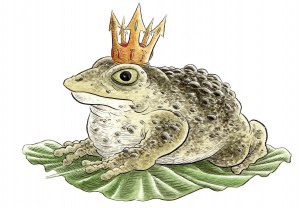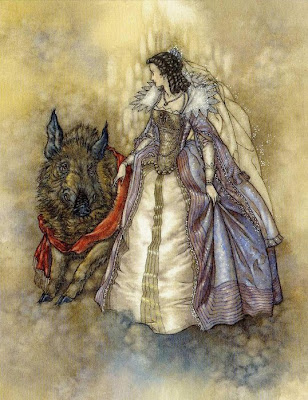
In which the Marvel universe comes to the aid of a damsel in distress...
Today’s fairy tale is a simple, fun one that features not one, not two, but THREE magical helpers: Long, Broad, and Quickeye. Each one of these fine fellows possesses a unique talent, much like the members of the Fantastic 4, or the X-Men. One of them even blows stuff up with his incredible eyesight, just like Cyclops!
If that’s not enough to pique your interest, there’s also a sad, enchanted maiden, a prince who falls in love with her (emotionally unavailable people are so attractive), and a mean, old wizard.
From Andrew Lang’s Grey Fairy Book.
LONG, BROAD, AND QUICKEYE
Once upon a time there lived a king who had an only son whom he loved dearly. Now one day the king sent for his son and said to him:
‘My dearest child, my hair is grey and I am old, and soon I shall feel no more the warmth of the sun, or look upon the trees and flowers. But before I die I should like to see you with a good wife; therefore marry, my son, as speedily as possible.’
‘My father,’ replied the prince, ‘now and always, I ask nothing better than to do your bidding, but I know of no daughter-in-law that I could give you.’
On hearing these words the old king drew from his pocket a key of gold, and gave it to his son, saying:
‘Go up the staircase, right up to the top of the tower. Look carefully round you, and then come and tell me which you like best of all that you see.’
So the young man went up. He had never before been in the tower, and had no idea what it might contain.
The staircase wound round and round and round, till the prince was almost giddy, and every now and then he caught sight of a large room that opened out from the side. But he had been told to go to the top, and to the top he went. Then he found himself in a hall, which had an iron door at one end. This door he unlocked with his golden key, and he passed through into a vast chamber which had a roof of blue sprinkled with golden stars, and a carpet of green silk soft as turf. Twelve windows framed in gold let in the light of the sun, and on every window was painted the figure of a young girl, each more beautiful than the last. While the prince gazed at them in surprise, not knowing which he liked best, the girls began to lift their eyes and smile at him. He waited, expecting them to speak, but no sound came.
Suddenly he noticed that one of the windows was covered by a curtain of white silk.
He lifted it, and saw before him the image of a maiden beautiful as the day and sad as the tomb, clothed in a white robe, having a girdle of silver and a crown of pearls. The prince stood and gazed at her, as if he had been turned into stone, but as he looked the sadness which, was on her face seemed to pass into his heart, and he cried out:
‘This one shall be my wife. This one and no other.’
As he said the words the young girl blushed and hung her head, and all the other figures vanished.
The young prince went quickly back to his father, and told him all he had seen and which wife he had chosen. The old man listened to him full of sorrow, and then he spoke:
‘You have done ill, my son, to search out that which was hidden, and you are running to meet a great danger. This young girl has fallen into the power of a wicked sorcerer, who lives in an iron castle. Many young men have tried to deliver her, and none have ever come back. But what is done is done! You have given your word, and it cannot be broken. Go, dare your fate, and return to me safe and sound.’
So the prince embraced his father, mounted his horse, and set forth to seek his bride. He rode on gaily for several hours, till he found himself in a wood where he had never been before, and soon lost his way among its winding paths and deep valleys. He tried in vain to see where he was: the thick trees shut out the sun, and he could not tell which was north and which was south, so that he might know what direction to make for. He felt in despair, and had quite given up all hope of getting out of this horrible place, when he heard a voice calling to him.
‘Hey! hey! stop a minute!’
How does the prince find Xavier’s School for Gifted Youngsters his way through the terrible forest? Find out.






 While failure
While failure 

